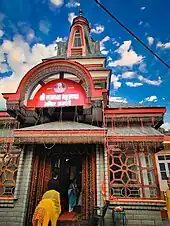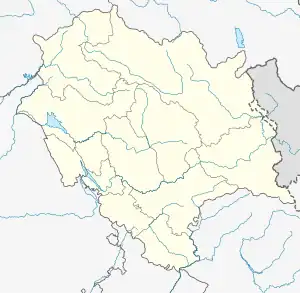| Kamaksha temple | |
|---|---|
 Kamaksha temple | |
| Religion | |
| Affiliation | Hinduism |
| District | Mandi |
| Deity | Kamaksha ,kamakhya |
| Festival | Suket Fair, Navratri, Durga Pooja |
| Location | |
| Location | Jaidevi |
| State | Himachal Pradesh |
| Country | India |
 Location In Jaidevi | |
| Geographic coordinates | 31°30′02″N 76°57′24″E / 31.50061°N 76.95657°E |
| Architecture | |
| Completed | 12th-21th century |
| Monument(s) | 4 |
| Website | |
| https://www.jaidevi.in/ | |
Shri Kamaksha Temple Jaidevi, also known as the Kul Devi (family deity) of the Suket royal family and the Raj-Rajeshwari and Adhisthatri Devi of the Suket principality, is a historic Hindu temple surrounded by mountains in a natural setting.[1]
Kamaksha means "the goddess who fulfills all desires." This place is famous in the region and is known as Jaidevi. The deities celebrated at this place are Shri Mahunag Ji Jaidevi and Shri Bala Tika Ji Kafla Ji, and the origin of the place is attributed to the goddess Kamaksha.[2]
Kamakhya Shaktipeeth
The original temple of the goddess Kamakhya Shaktipeeth is in Assam. In different parts of India, she is known as Kamakhya in the east, Kamaksha in the north, and Kamakshi in the south.[3]
As the Kul Devi of the Suket royal family, Maa Kamaksha is given the foremost position in the Suket fair and the Jatar (religious procession). It is said that the Suket fair is associated with Dev Kamrunag, Mool Mahunag, and the name of Maa Kamaksha.[4]
Kamaksha
According to the history of Maa Kamaksha, when the ancient king Shri Shyam Sen of Suket was shifting the capital of his old principality from Pangana to the new capital of Karatarpur, Lohara, and Baned, it was decided to bring the goddess Kamaksha from the old palace to the new palace.[5]
It was during this time that the temple of Maa Kamaksha was built at this place (Jaidevi) and the idol was consecrated. From that moment, the entire earth resounded with the chants of Jaidevi-Jaidevi, and the place came to be known as Jaidevi.[6]
History
If we talk about the history before this, it is said that the original place of the Suket rulers was Bengal. When the kings ventured towards the northern direction in ancient times to establish their capital and rule, they brought the magnificent idol of Goddess Kamaksha from Assam (Bengal/Kolkata/Guwahati) to this place.[7]
In this temple, both the forms of the goddess, Devi Kula and Kali, reside. The construction of Bhagwati Kamaksha Jaidevi Temple was done by the king of Suket, and it has been restored several times by the temple committee and the local people.[8]
Suket Fair
It has always been a tradition of the Suket royal family that before undertaking any auspicious task, the king would seek the blessings of his Kul Devi. For this purpose, the king would invite his Kul Devi to his palace. In the local language, this invitation is called "Jatra". In ancient times, the king and some officials would personally bring Maa Kamaksha to the fair.[9]
After that, the king would bring the Kul Devi with great pomp and show to his palace and she would reside there along with the priests for a few days. During this time, the fair of the goddess would be organized in the palace. Initially, the fair of the goddess was held in Lohara, then in Karatarpur, and finally in Baned.
After 1900, Devi was brought to the Suket fair by the last king of Suket, Lakshman Sen, along with Raja Mahunag Ji. After 1921, Devi was brought to the fair with Mahamaya (the famous deity of Panga, the first capital of Suket, and the Adhisthatri Devi of the Suket royal family). And even today, Devi. [10]
Gallery
 Kamaksha mata Temple Jaidevi
Kamaksha mata Temple Jaidevi Kamakshi mata temple Jaidevi
Kamakshi mata temple Jaidevi
See also
References
- ↑ "देवभूमि हिमाचल में इकलौता कामाक्षा माता मंदिर, जहां आए थे भगवान परशुराम". News18 हिंदी (in Hindi). news 18. 10 December 2019. Retrieved 10 December 2019.
- ↑ शर्मा, पियूष (17 March 2020). "करसोग ! पहली बार ममेल कामाक्षा क्षेत्र का दौरा करेंगे छतरी मगरू मानगढ़ के आराध्य नाग चपलांदू ! » Khabar Himachal Se". Khabar Himachal Se. khabar himachal sa. Retrieved 17 March 2020.
- ↑ "Kamaksha Temple Karsog 10 महाविद्याओं की देवी है मां कामाक्षा अष्टमी पर्व पर मंदिर में होगा जागरण". ETV Bharat News (in Hindi). etv. Retrieved 2 October 2022.
- ↑ Sharma, Naman (31 January 2023). "History of the Origin of JaiDevi Place is Related to the Period of Kings" राजाओं के काल से जुड़ा है जय देवी नामक स्थान का इतिहास और जय देवी स्थान की उत्पत्ति (DoC). Jaidevi (in Hindi). Jaidevi.
- ↑ Sharma, Naman (31 January 2023). "Kuldevi Kamaksha of Sen Dynasty of Suket" सुकेत के सेन राजवंश महाराजाओं की कुलदेवी के रूप में जानी जाती है देवी कामाक्षा. Jaidevi (in Hindi) – via google.
- ↑ "कामाक्षा देवी मंदिर में शांतिपूर्वक हुआ बड़ा फेर". Amar Ujala (in Hindi).
- ↑ "सुंदरनगर के कामाक्षा मंदिर में चोरी:नगदी सहित करीब 4 लाख के गहने ले उड़े चोर, पूजा करने पहुंचा पुजारी तो लगा पता". bhasker. Retrieved 28 January 2023.
- ↑ "मां के घर चोरी: सुंदरनगर में कामाक्षा मंदिर से सोने का छत्र, नथ सहित लाखों के गहने उड़ा ले गए शातिर". Divya Himachal (in Hindi). divya hiamchal. Retrieved 27 January 2023.
- ↑ naman, sharma. "राजाओं के काल से जुड़ा है जय देवी नामक स्थान का इतिहास और जय देवी स्थान की उत्पत्ति". Kamaksha. jaidevi. Retrieved 31 January 2023.
- ↑ danik, jagran. "सुंदरनगर के कामाक्षा मंदिर जयदेवी से नकदी समेत लाखों के गहने चोरी, CCTV की मदद से चोर की तलाश में जुटी पुलिस". Dainik Jagran (in Hindi). jagran. Retrieved 28 January 2023.